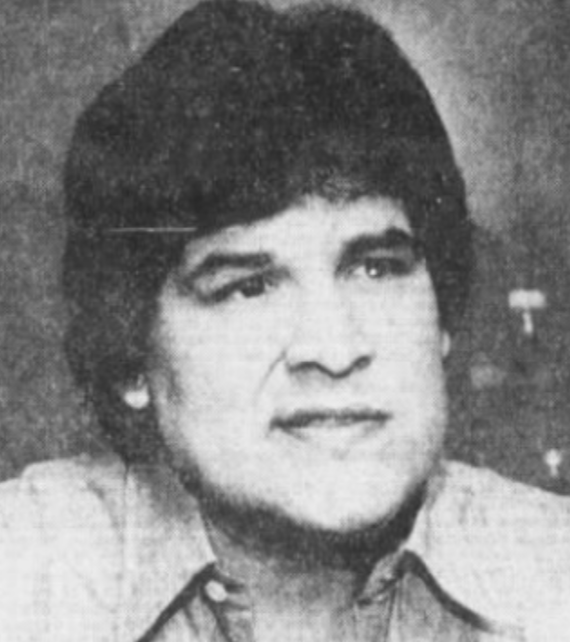 The Arizona Republic, Oct. 22, 1981.
On April 10, 1976, Tony Calistro, 24, and Cruz Martinez, 15, walked from their homes to a nearby store in Glendale, Arizona, to buy beer. At the store, they spoke with Joe Cota Morales, 28, and Morales’s cousin, Ruben Melendez, 18. The four bought beer and whiskey then walked back to Morales’s backyard. In addition to drinking alcohol, Martinez would later testify that he had also injected himself with heroin that morning.
In the backyard, Calistro insulted Melendez, who had been wrestling with Morales. Melendez responded by knocking Calistro down, then, according to later testimony by Martinez, the group began kicking and hitting Calistro.
Martinez would also later testify that after this beating, they took Calistro to a nearby park. Martinez said he briefly left and returned to the park with paint and a garden hoe. Calistro’s clothes were removed, and he was sodomized with the garden hoe and painted. He was stabbed 19 times and his autopsy showed he died as a result of these stab wounds. His body was found tied to playground equipment the next morning.
Within days, police arrested Morales, Melendez, and Martinez. Morales told police he had nothing to do with Calistro’s death and had tried to stop it. On April 20, 1976, Morales and Melendez were indicted for Calistro’s murder. Martinez entered into a plea agreement under which he would be tried as a juvenile in return for testifying against Morales and Melendez.
The jury trial of Morales and Melendez began in November 1976 in Maricopa County Superior Court. Judge Dorothy Carson presided over the trial. Martinez served as the state’s key witness.
Martinez testified that Morales had led the group in violently turning against Calistro and that Morales had stabbed Calistro. He testified that on the night of the crime, following the beating, Morales had told Martinez he was returning to the park to “finish off” Calistro and threatened him not to tell anyone. The existence of Martinez’s plea agreement was disclosed to the jury but the court did not allow the defense to cross-examine Martinez about the agreement.
Melendez testified that he was present during the attack but was barely involved. He said he was bothered by the sight of blood and went home. Morales did not testify.
Both Morales and Melendez were convicted of first-degree murder on November 19, 1976 and sentenced to death.
After testifying, Martinez was placed in the custody of the Adobe Mountain School, a juvenile facility run by the Arizona Department of Corrections.
On October 30, 1978, the Arizona Supreme Court reversed the convictions of Morales and Melendez and ordered new trials, ruling that the defense had been improperly restricted from cross-examining Martinez about his plea agreement.
Melendez’s and Morales’s cases were severed prior to their second trials, and Melendez pled guilty to first-degree murder, receiving a life sentence.
Prior to the start of Morales’s second trial, his attorney moved to compel discovery of Martinez’s files from the Adobe Mountain School, for the purpose of accessing statements made by Martinez to various school counselors about Calistro’s murder. The motion also sought to compel discovery of various psychiatric and psychological reports on Martinez, as well as to order a psychiatric evaluation of Martinez. These motions were denied.
Morales’s trial began in August 1979 with Judge James Moeller presiding. Martinez again served as the state’s key witness. The jury found Morales guilty of first-degree murder on September 5, 1979. He received a life sentence.
On appeal, Morales argued that the court erred in failing to compel the discovery of the Martinez files. Morales had sought to examine these files because he believed Martinez had made statements to counselors that were inconsistent with his trial testimony. Additionally, Morales believed these files would provide evidence of Martinez’s addiction to heroin and sniffing glue, which could have been relevant to his credibility.
On June 12, 1981, Morales’s second conviction was overturned and the case was remanded for a new trial because the Arizona Supreme Court found the trial court had erred in denying Morales’s motion to compel discovery of Martinez’s Adobe Mountain files.
Morales’s third trial began in October 1981, with Judge Marilyn Riddel presiding. William Feldhacker represented Morales. Taking the stand for the first time, Morales testified that he did not participate in killing Calistro. He told jurors that he was present during the attack and tried to stop it but his pleas were ignored. Available records do not provide information about Martinez’s testimony, if any, at this trial.
The jury acquitted Morales on October 16, 1981. “I knew I just had to be patient and that the truth would come out,” Morales said after his acquittal.
- Meghan Barrett Cousino |